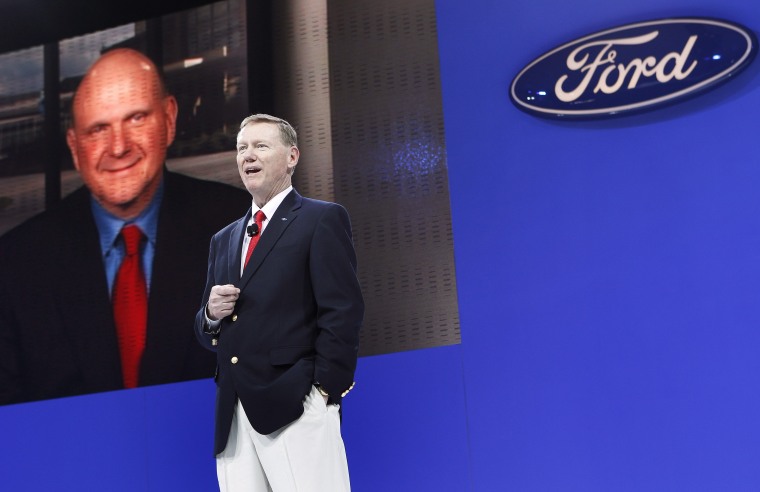Ford Motor Co. CEO Alan Mulally has broken his silence and quashed rampant rumors suggesting he would leave the suburban Detroit automaker for a job as the next chief executive of software giant Microsoft.
Mulally, a former Boeing executive, has been widely credited with turning around Ford during his seven years in Motown, and it had been suggested that he could lend his organizational skills to Microsoft following the retirement of CEO of Steve Ballmer, who last year announced plans to step down no later than August 2014.
Until now, Mulally had avoided directly commenting on rumors that he was a primary candidate for the Microsoft job, but the Ford board of directors was said to be increasingly concerned about the distraction the headlines were creating, both for Mulally and the automaker.
"I would like to end the Microsoft speculation because I have no other plans to do anything other than serve Ford," Mulally said in an interview Tuesday with The Associated Press. Asked directly whether this meant he was going to remain at Ford, Mulally added that, "You don't have to worry about me leaving."
The 68-year-old executive, trained as an aeronautical engineer, spent 36 years with Boeing Co. where he rose to president of the commercial aircraft operations before being personally recruited by Ford Chairman and family heir William Clay Ford Jr.
It was a critical time for Ford, which was running ever-deeper into the red and worried that it might have to declare bankruptcy – the path ultimately taken by General Motors and Chrysler. What Mulally discovered was not just a company running up increasingly serious losses but one with a dysfunctional corporate culture in which personal ambition was considered a higher priority than the company’s welfare.
In an early interview with TheDetroitBureau.com, Mulally recalled his first regular Thursday meeting with senior Ford managers during which all agreed everything was fine. “Then how come I’m going to have to report the biggest loss in Ford history?” the then-new CEO blurted out. At the next Thursday meeting, things began to change, with Mark Fields, then Ford’s president of the Americas, raising his hand to report a problem with a new product launch.
“Good exposure,” Mulally responded, triggering other executives in the room to reveal issues they also were facing.
Since the industry began to bottom out, Ford has generated $32.9 billion pre-tax profits and seen its stock price surge from barely a $1 low to a $15.38 close Tuesday.
That’s not to say Ford doesn’t have problems. The maker recently forecast its earnings will dip in 2014, in part due to increased investments in products and an aggressive expansion program in China. Ford also has been hammered for quality lapses — ironically, many of the complaints involving the Sync infotainment system the maker developed with the help of Microsoft.
The software giant has been aggressively courting the auto industry and had initially been seen as a leader in in-car technology, but it is facing increasing challenges, notably from Google, which this week announced that several key automakers will now use a mobile version of the Android operating system in their vehicles.
Analysts say that while Microsoft is still a quite profitable company, it faces some of the internal challenges that had crippled Ford, notably the constant squabbling between different corporate business units. Adopting the global One Ford strategy that Mulally put together was seen as a potential fix for Microsoft.
Neither company ever formally confirmed that Mulally was in the running to replace Ballmer, a controversial and often blustery executive who generated a strong upward jump in Microsoft stock when he announced his planned retirement.
Why did Mulally suddenly decide to speak out after months of sidestepping the question? One official suggested he may have simply gotten tired of being asked. It's also possible that the executive wanted to end the speculation before it would become a distraction at next week’s North American International Auto Show. Ford is expected to be one of the stars of that event when it unveils the new, aluminum-intensive remake of its F-150 pickup, a design that could improve fuel economy by as much as 5 mpg.
More from The Detroit Bureau:
First Chinese Automaker Finally Ready to Enter US Market After Repeated Delays
Toyota's New Hydrogen Car Makes US Debut; Sales Launch Moved Ahead
